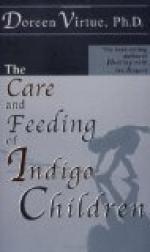Are fruits likely to disturb a nursing infant?
Sour fruits in some cases may do so, but sweet fruits and most cooked fruits are useful.
What else is important in the life of the nursing mother?
She should lead a simple natural life; should have regular out-of-door exercise, preferably walking or driving, as soon after her confinement as her condition will permit. She should have regular movements from the bowels daily. She should be as free as possible from unnecessary cares and worry; her rest at night should be disturbed as little as possible; she should lie down for at least one hour in the middle of the day.
Does the nervous condition of the mother affect the milk?
Very much more than her diet; worry, anxiety, fatigue, loss of sleep, household cares, social dissipation etc., have more than anything else to do with the failure of the modern mother as a nurse. Uncontrolled emotions, grief, excitement, fright, passion, may cause milk to disagree with the child; at times they may excite acute illness, and at other times they may cause a sudden and complete disappearance of the milk.
Does menstruation affect the milk?
In nearly all cases the quantity of milk is lessened so that the infant is not satisfied and may gain less in weight or not at all. In many cases the quality of the milk is also affected to such a degree as to cause slight disturbances of digestion, such as restlessness, colic, and perhaps some derangement of the bowels. In a few, attacks of acute indigestion are excited.
Is regular menstruation a reason for stopping nursing?
Not invariably; as a rule both functions do not go on together. But if the child is gaining regularly in weight between the periods, nursing may be continued indefinitely, although it may be well to feed the infant wholly or in part during the first day or two that the mother is unwell.
What symptoms indicate that a nursing infant is well nourished?
The child has a good colour, sleeps for two or three hours after nursing, or, if awake, is quiet, good-natured, and apparently comfortable. It has normal movements of the bowels and gains steadily in weight.
What symptoms indicate that a child who is nursing is not properly nourished?
It does not gain and may even lose in weight. It no longer exhibits its usual energy and playfulness, but is either listless and indifferent or cross, fretful and irritable, and is apt to sleep poorly. It grows pale and anaemic and its tissues become soft and flabby. When the milk is scanty it will often nurse a long time at the breasts, sometimes three quarters of an hour, before stopping. At other times it may take the breast for a moment only, and then turn away in apparent disgust.
What should be done when such symptoms appear?
This depends upon the severity of the symptoms and how long they have lasted. If the child has made no gain for three or four weeks, or is losing weight, immediate weaning will probably be necessary; in any case, other food in addition to the breast milk should be given at once. One may begin by alternating the nursing and the bottle-feeding and increase the number of bottle-feedings as may be indicated by the results.




